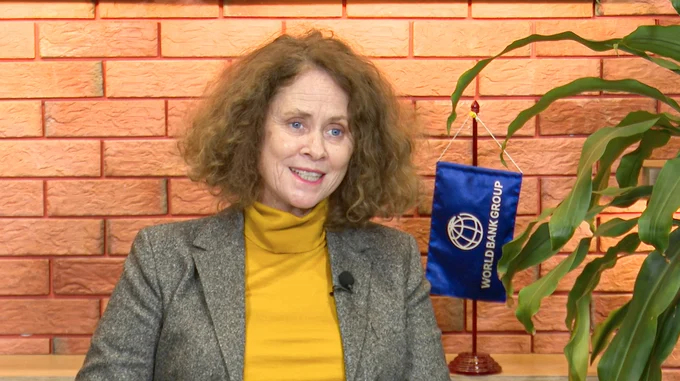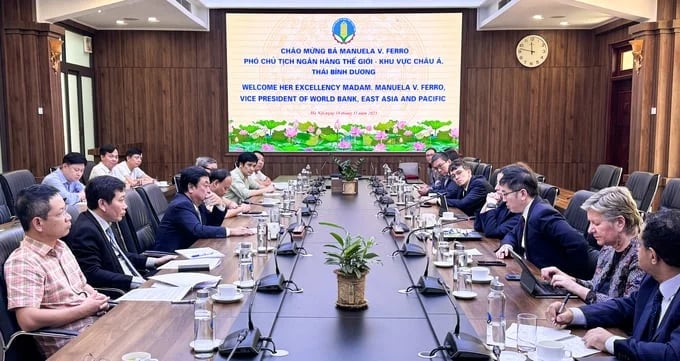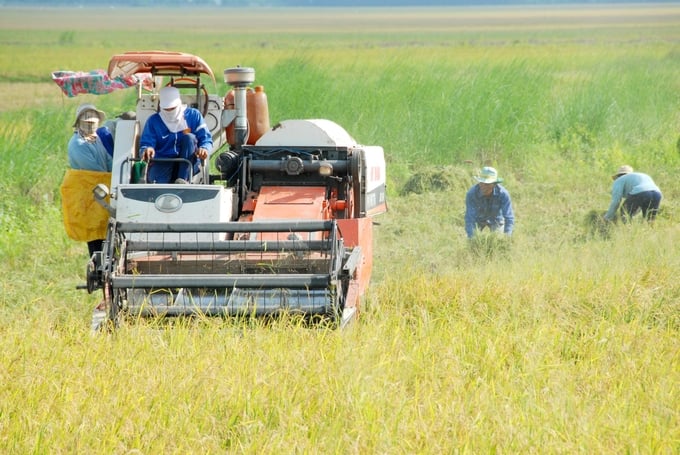May 21, 2025 | 07:24 GMT +7
May 21, 2025 | 07:24 GMT +7
Hotline: 0913.378.918
May 21, 2025 | 07:24 GMT +7
Hotline: 0913.378.918
The agricultural sector's remarkable growth and export competitiveness over the past 30 years are gradually slowing down. The average annual agricultural value added recently reached 3%, compared to the over 5% observed in the decade preceding 2010.

Ms. Carolyn Turk, World Bank Country Director for Vietnam. Photo: Duy Hoc.
Since the 1990s, global rice production capacity has steadily decreased due to high dependence on available resources and input materials. The rice production industry's development is imperiled by challenges such as environmental degradation and the impact of climate change. Therefore, Vietnam's agricultural sector must evolve to address structural challenges and cater to the changing needs of society.
As environmental degradation progresses, ecosystems become incapable of supporting human life, making agricultural production increasingly difficult. Extreme climate events are anticipated to result in yield deficits in various crops. Specifically, forecasts indicate that crop output could decrease by more than 6% by 2030 and more than 13% by 2050 due to the impact of climate change. The consequences of saltwater intrusion in the Mekong Delta in 2015-2016 vividly illustrate the potential challenges.
All these factors pose significant hurdles to the industry's efforts. Therefore, there is an urgent need to explore more optimal ways to meet the growing food needs of the population and address the evolving consumption patterns of a burgeoning populace. Effective production practices will enhance the competitiveness of Vietnamese rice in the international market.
The WB expresses profound appreciation for the strategic vision of the Vietnamese Government. The MARD has greenlit the new Strategy on Sustainable Agriculture and Rural Development for 2021-2030, with a forward-looking vision to 2050, officially sanctioned by the Prime Minister in January 2022. The Ministry has further approved and issued an action plan to implement the new strategy, slated for deployment by September 2022. In June 2022, the Government unveiled Regulations that underscore the emphasis on promoting environmentally friendly, responsive agriculture in the face of climate change and a commitment to limit carbon emissions.
At COP 26, Vietnam solidified its dedication to addressing climate challenges by setting a target of achieving zero methane emissions by 2050 and committing to a 30% reduction in methane by 2030. The global community recognizes the unwavering determination of the Vietnamese Government to confront the challenges facing the agricultural sector.
The Nationally Determined Contribution (NDC) report submitted by Vietnam in October 2022 marked a substantial increase in the NDC targets for the agricultural sector. The unconditional contributions to the agricultural sector in 2030 surged from 6.8 million tons (NDC 2020) to 12.4 million tons (NDC 2022). Additionally, the conditional NDC target for agriculture rose from 32.6 million tons (NDC 2020) to 50.9 million tons (NDC 2022). Accommodating these upgraded NDC targets for the agricultural sector is anticipated to necessitate funding ranging from 2.1 billion USD to 16.1 billion USD.
Since last year, the World Bank has collaborated closely with the MARD in conceptualizing and developing the One Million Hectares of High-Quality Rice Project. This groundbreaking project supports 18 million Mekong Delta farmers in transitioning to sustainable production models and significantly contributes to regional food security.
We are pleased to announce that the Project has received governmental approval and will be officially unveiled during the upcoming International Festival of Rice Industry - Hau Giang 2023. The World Bank reaffirms its commitment to supporting this transformative project by providing financial and professional assistance.

Meeting on carbon credit commercialization between the MARD and the World Bank. Photo: Quynh Chi.
I would like to emphasize specific aspects of our support policy for the One Million Hectares Program, underscoring the World Bank's commitment to collaborating with the Government of Vietnam to promote sustainable agriculture, focusing on transitioning to low-carbon practices, especially in the rice sector.
Our support program draws upon the successful experiences gleaned from our collaboration with the Ministry of Agriculture and Rural Development (MARD) in implementing the Vietnam Sustainable Agricultural Transformation Project (VnSAT), generously funded with 221 million USD from the International Development Association (IDA). VnSAT has yielded significant benefits, impacting one million people in the Mekong Delta.
By implementing precision agricultural practices (GAP), the project has effectively enhanced rice productivity and increased farmers' income. Notably, we achieved the goals of reducing environmental pollution, successfully curbing emissions by over 1.5 million tons of greenhouse gases from rice cultivation annually.
Second, our support program is grounded in local and global scientific and technological innovation. For instance, the WB report titled "Towards Green Agriculture Transformation in Vietnam: Shifting to a Low Carbon Rice Model," published in September 2022, affirms the potential of this transformative direction. We aim to cut methane emissions by 30% by 2030, concurrently improving resource efficiency, output, resilience, and competitiveness.
The envisioned transformation necessitates significant investment and substantial policy reforms to foster change at all levels, from farm households to the broader economy.
Third, we are mobilizing carbon capital to co-finance the One Million Hectares Project. Vietnam deserves commendation from the global community for its persistent efforts in addressing climate change, a challenge of global significance. We eagerly anticipate expediting the project's preparation and implementation process.
Effectively scaling up from 185,000 hectares (VnSAT) to one million hectares and beyond, especially under evolving economic and technological conditions, presents a formidable challenge for the Project.
However, we strongly believe in establishing a robust network that comprehensively links the public and private sectors, international organizations, investors, and scientists. This collaborative effort ensures the Project's success, enhances sustainability and facilitates interdisciplinary exchange.
In light of this, the Ministry of Agriculture and Rural Development should consider establishing a center for low-carbon rice innovation. This center would focus on researching and deploying digital technology, attracting private sector investment, promoting climate-smart agricultural practices, establishing and operating measurement, reporting and verification (MRV) systems for carbon credits, and advancing branding and marketing initiatives for Mekong Delta rice.

The transition to green agriculture will require significant investment and major policy reforms.
Undoubtedly, the transition to green agriculture demands substantial investment and significant policy reforms. However, crucial elements highlighted above might need to be present in the World Bank's lending process due to existing Official Development Assistance (ODA) regulations, which currently confine multilateral development bank funds solely to financing infrastructure projects.
Recognizing this limitation, the World Bank team has explored innovative avenues, engaging private entities in discussions that have yielded positive feedback. This approach has also been presented to the Ministry of Agriculture and Rural Development (MARD), receiving a favorable response. Acting as a bridge, the World Bank seeks to facilitate not only collaboration between public and private entities but also coordination among various Vietnamese agencies, including the MARD, Ministry of Finance, Ministry of Natural Resources and Environment, and other relevant bodies. The objective is to guide the government in adopting a comprehensive approach, steering towards the ambitious goal of achieving low carbon emissions, ultimately aiming for net-zero emissions by 2050.
The World Bank stands ready to leverage its influence in mobilizing capital and garnering support from corporations, charities, and other stakeholders for this transformative platform. If a low-carbon rice innovation unit is established, Vietnam will stand as a trailblazer, pioneering a pilot mechanism for technological innovation to scale up the business model. Embracing low-carbon, environmentally sustainable rice production aligns with global sustainability goals and positions Vietnamese agricultural products with a distinctive brand in the global market. This strategic initiative holds the potential to elevate Vietnam's agricultural sector to new heights, creating a model for others to emulate in the pursuit of a sustainable and climate-resilient future.
Edited by Quynh Chi

(VAN) Japan's grant aid project contributes to capacity building, promoting organic agricultural production, and fostering sustainable community development in Dong Thap province.

(VAN) For years, the CRISPR-Cas9 genome technology has been reshaping genetic engineering, a precision tool to transform everything from agriculture to medicine.

(VAN) Vietnam aims to become a 'leader' in the region in the capacity and managing effectively soil health and crop nutrition.
![Reducing emissions from rice fields: [Part 1] Farming clean rice together](https://t.ex-cdn.com/nongnghiepmoitruong.vn/608w/files/news/2025/05/05/z6509661417740_a647202949c539012a959e841c03e1d3-nongnghiep-143611.jpg)
(VAN) Growing clean rice helps reduce environmental pollution while increasing income, allowing farmers to feel secure in production and remain committed to their fields for the long term.
/2025/05/19/5136-1-144800_230.jpg)
(VAN) The Nghe An Provincial People's Committee has just approved the list of beneficiaries eligible for revenue from the Emission Reductions Payment Agreement (ERPA) in the North Central region for the year 2025.

(VAN) 14 out of 35 domesticated elephants in Dak Lak province have had their living conditions improved, with 11 of them currently participating in the non-riding elephant tourism model.

(VAN) Muong Nhe Nature Reserve hopes that being upgraded to a national park will lay the foundation for forest protection efforts to be carried out in a systematic, modern, and sustainable manner.